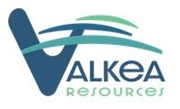New Found (NFG.V): Intercepts 61.50 g/t Au over 5.20m at Keats 65m Step-Out, Extends High-Grade Zone to 530m Down Plunge
Vancouver, BC, October 14, 2021: New Found Gold Corp. (“New Found” or the “Company”) (TSXV: NFG, OTC: NFGFF) is pleased to announce recently received assay results from eleven holes drilled at the Keats Zone (“Keats”), located along the Appleton Fault Zone. These holes were completed as part of the Company’s ongoing 200,000m diamond drill program at its 100% owned Queensway Project (“Queensway”), located on the Trans-Canada Highway 15 km west of Gander, Newfoundland.
Highlights
- Highlight intervals are summarized below. Additional results are provided in Table 2.
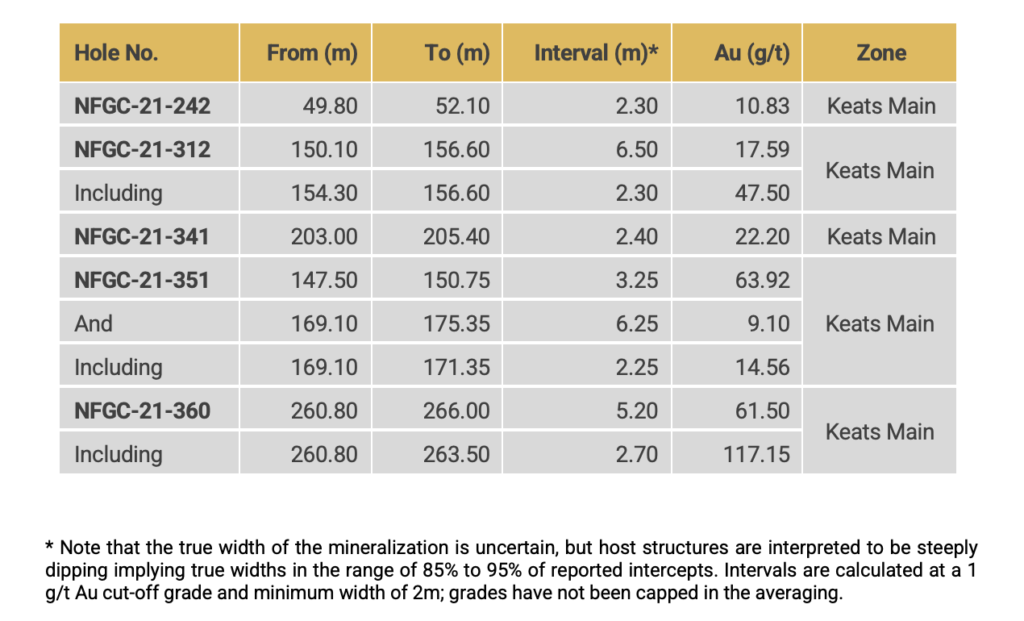
- The Keats Main Zone now extends 530m down-plunge, an increase of 65m from the previously reported distance of 465m defined by the furthest intercept to date in NFGC-21-360 grading 61.50 g/t Au over 5.20m.
- Intercepts of 17.59 g/t Au over 6.50m in NFGC-21-312 as well as 63.92 g/t Au over 3.25m and 9.10 g/t Au over 6.25m in NFGC-21-351 continue to demonstrate the high-grade up-dip continuity with robust widths above the core dilatational zone towards surface.
- Starting at surface the multiple high-grade zones at Keats now cover an overall footprint of approximately 250m in width x 490m along strike x 307m vertical depth and are open in all directions.
Greg Matheson, COO of New Found, stated: ” The high-grade continuity over a distance of 530m in a down-plunge direction is impressive but what’s truly encouraging is seeing this continuity continue above the core dilatational zone up-dip towards surface adding significant volume to the high-grade mineralization. In addition, the recently announced results from NFGC-21-238 yielding 88.53 g/t Au over 3.35m in the Keats Footwall has presented multiple exploration fronts as we continue to see the footprint of Keats expand in all directions. All of our drills at Keats and along the Appleton Fault are currently focused on expansion of these high-grade gold systems.”
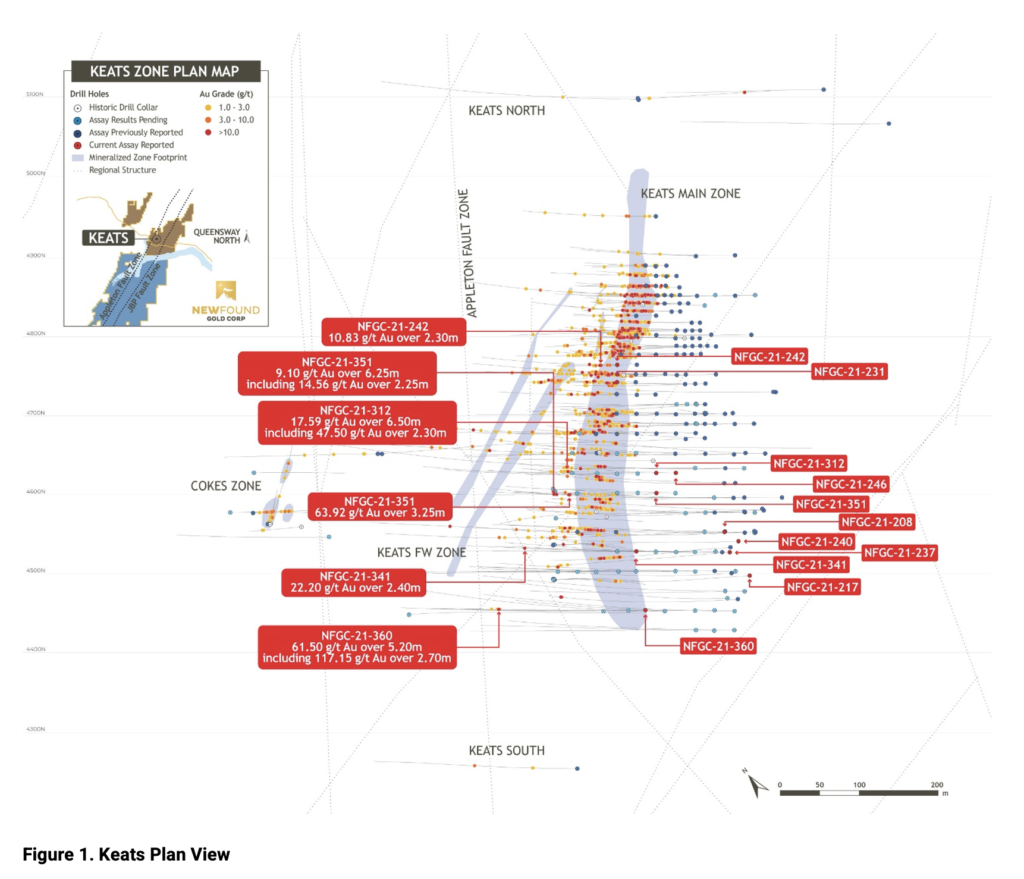
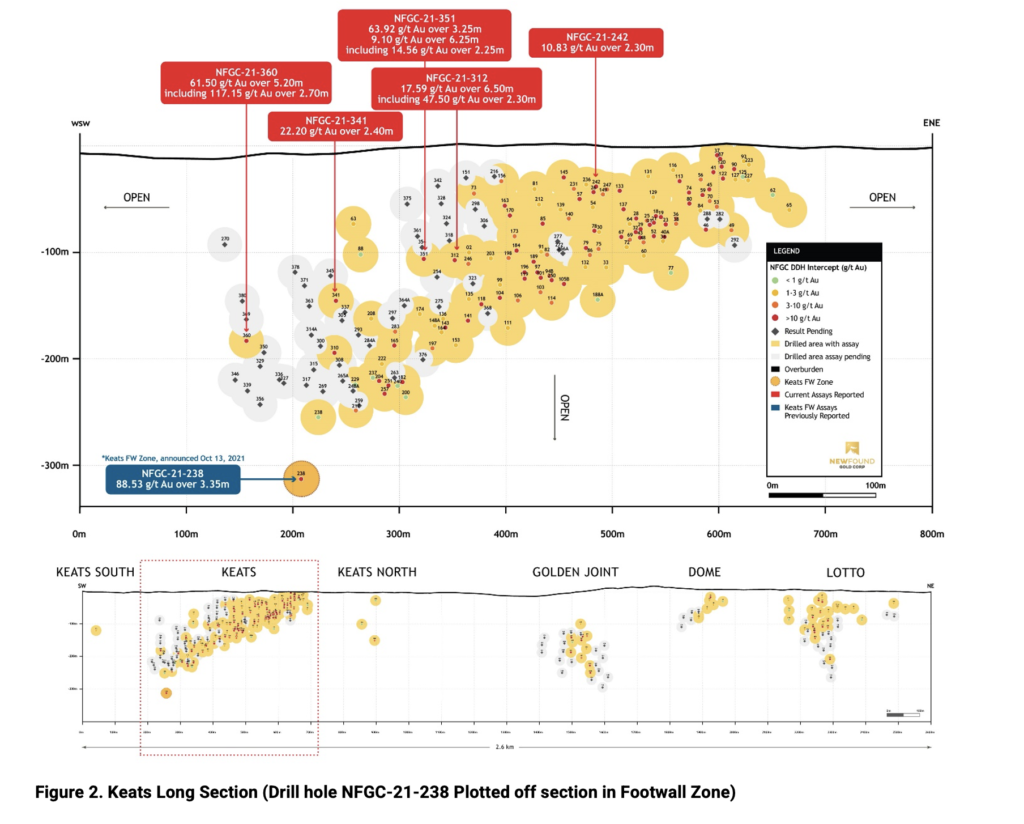
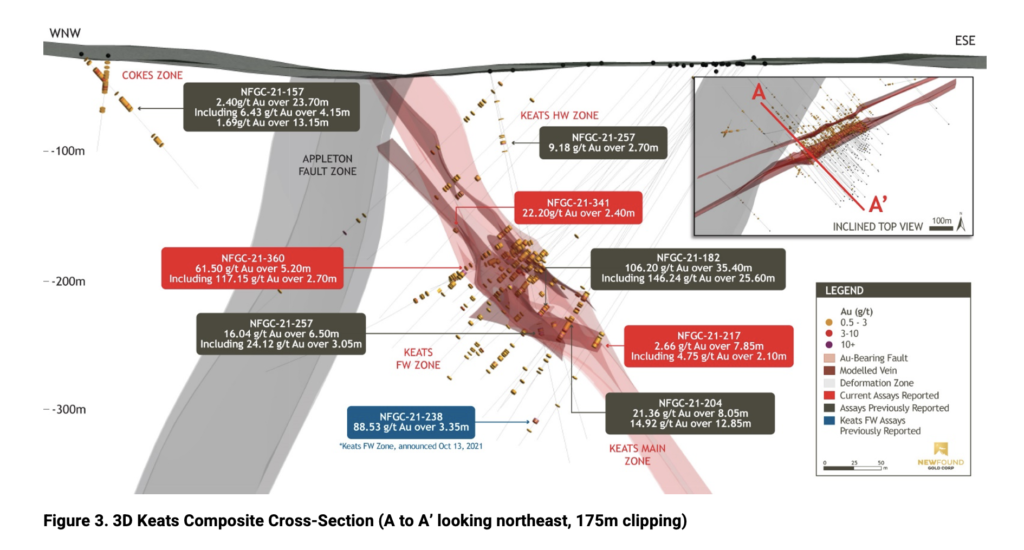
Discussion
- The Keats Main Zone is hosted within a faulted domain, the Keats-Baseline Fault, that contains a network of quartz veins that strike to the east-northeast and dip moderately to the southeast at approximately 55° as shown in Figure 3. The massive high-grade gold bearing quartz veins within this structural corridor are dominantly parallel to the orientation of the Keats host structure and drill hole structural data suggests some areas contain high-grade stockwork and spur type veins with a variety of orientations.
- Continued step-out drilling will work to expand mineralization south and up-dip of the core dilatational zone within the Keats Main Zone.
Drill Hole Details
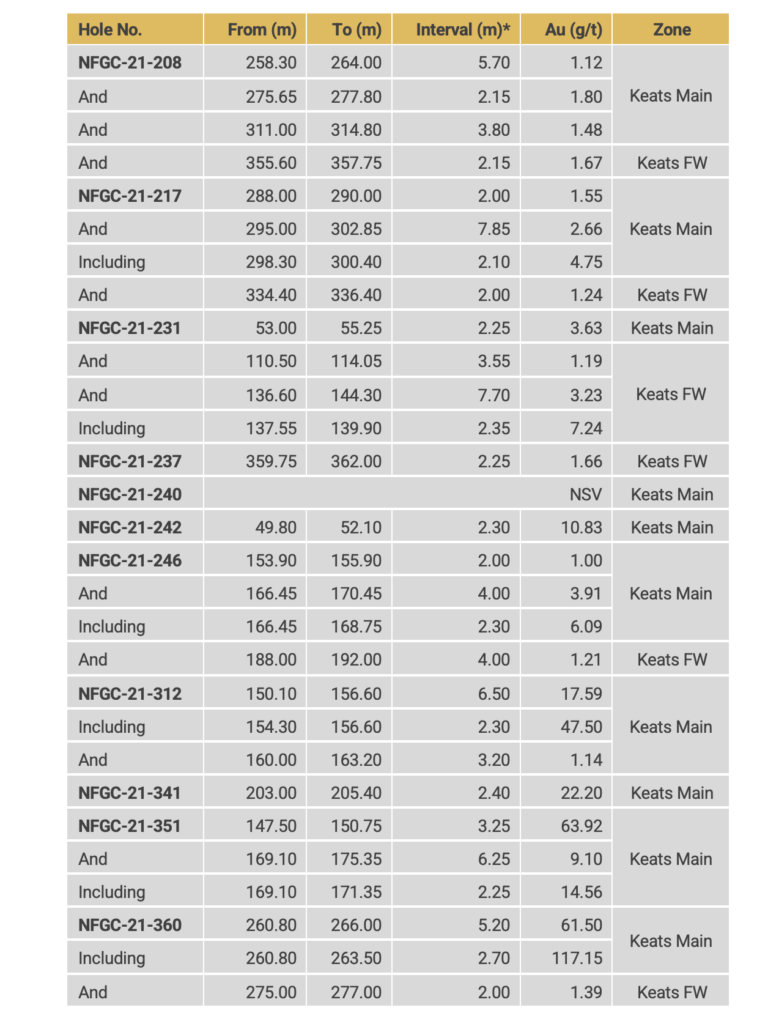

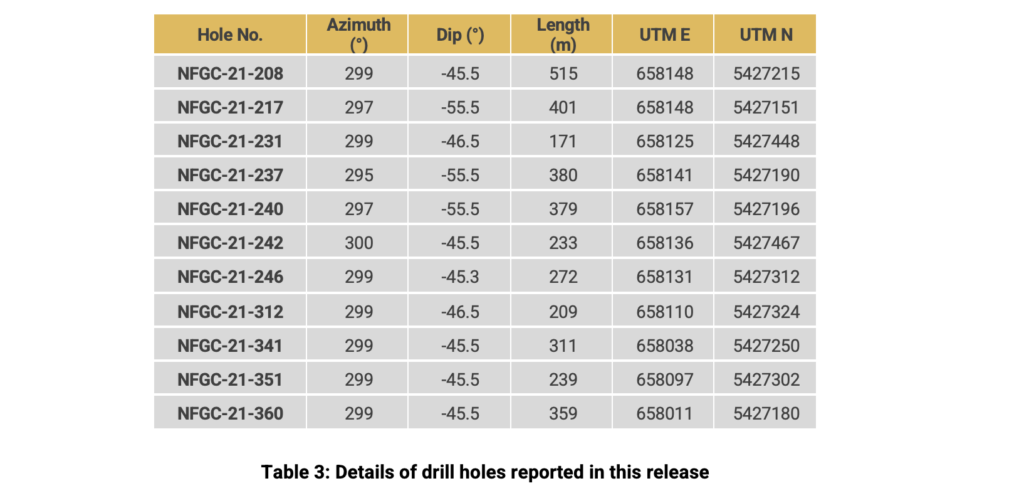
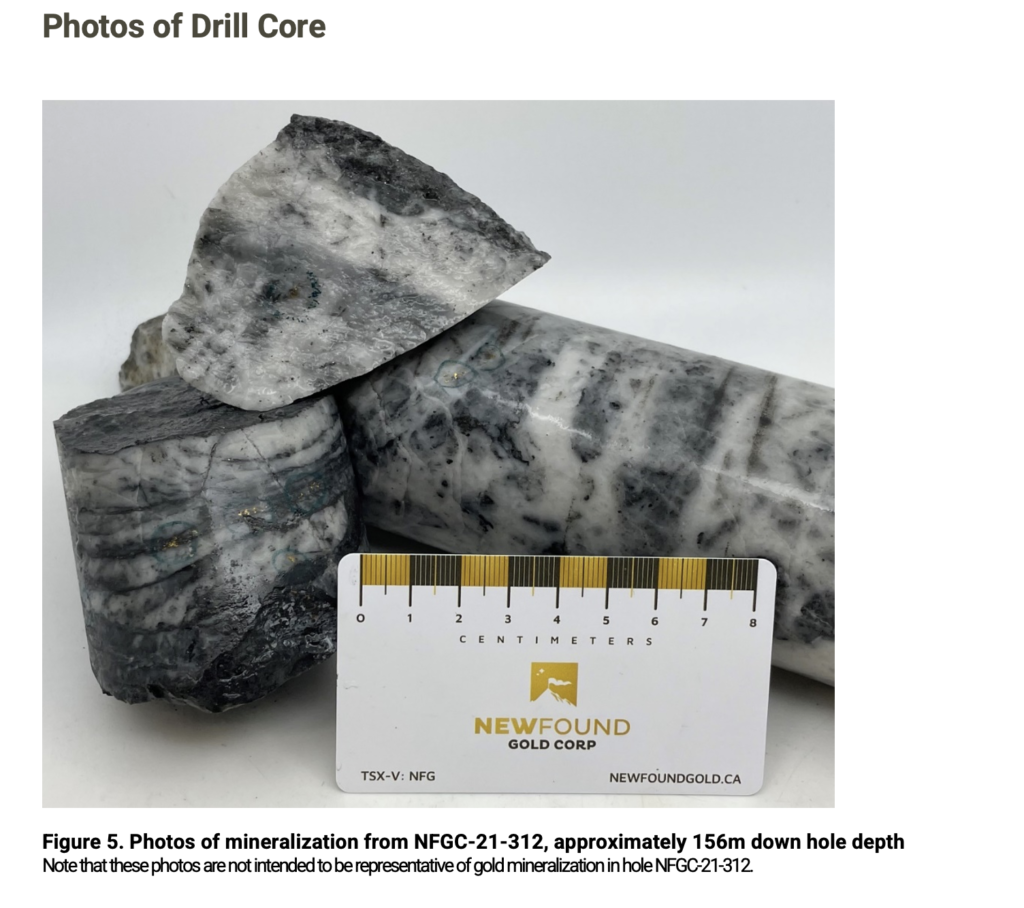
Queensway 200,000m Drill Program Update
Approximately 51 percent of the 200,000 meters have been drilled to date with approximately 24,000 meters of core pending assay results. Nine core rigs are currently operating, with a tenth scheduled to commence shortly.
Sampling, Sub-sampling and Laboratory
True widths of the intercepts reported in this press release have yet to be determined but are estimated to be 85% to 95% of reported core lengths. Infill veining in secondary structures with multiple orientations crosscutting the primary host structures are commonly observed in drill core which could result in additional variability in true width. Assays are uncut, and calculated intervals are reported over a minimum length of 2 meters using a lower cut-off of 1.0 g/t Au. All HQ split core assays reported were obtained by either complete sample metallic screen/fire assay or standard 30-gram fire-assaying with ICP finish at ALS Minerals in Vancouver, British Columbia, or by entire sample screened metallic screen fire assay at Eastern Analytical in Springdale, Newfoundland. The complete sample metallic screen assay method is selected by the geologist when samples contain coarse gold or any samples displaying gold initial fire assay values greater than 1.0 g/t Au. Drill program design, Quality Assurance/Quality Control and interpretation of results is performed by qualified persons employing a Quality Assurance/Quality Control program consistent with National Instrument 43-101 and industry best practices. Standards and blanks are included with every 20 samples for Quality Assurance/Quality Control purposes by the Company as well as the lab. Approximately 5% of sample pulps are sent to secondary laboratories for check assays.
Qualified Person
The technical content disclosed in this press release was reviewed and approved by Greg Matheson, P. Geo., Chief Operating Officer, and a Qualified Person as defined under National Instrument 43-101. Mr. Matheson consents to the publication of this news release dated October 14, 2021, by New Found. Mr. Matheson certifies that this news release fairly and accurately represents the information for which he is responsible.
About New Found Gold Corp.
New Found holds a 100% interest in the Queensway Project, located 15 km west of Gander, Newfoundland, and just 18 km from Gander International Airport. The project is intersected by the Trans-Canada Highway and has logging roads crosscutting the project, high voltage electric power lines running through the project area, and easy access to a highly skilled workforce. The Company is currently undertaking a 200,000m drill program at Queensway. With a current working capital balance of approximately $105 million, New Found is well funded for this program.
Please see the Company’s website at www.newfoundgold.ca and the Company’s SEDAR profile at www.sedar.com.
Acknowledgements
New Found acknowledges the financial support of the Junior Exploration Assistance Program, Department of Natural Resources, Government of Newfoundland and Labrador.
Contact
To contact the Company, please visit the Company’s website, www.newfoundgold.ca and make your request through our investor inquiry form. Our management has a pledge to be in touch with any investor inquiries within 24 hours.
New Found Gold Corp.
Per: “Craig Roberts”
Craig Roberts, P.Eng., Chief Executive Officer
Email: croberts@newfoundgold.ca
Phone: + 1 (910) 406-2407
Neither the TSX Venture Exchange nor its Regulation Services Provider (as that term is defined in the policies of the TSX Venture Exchange) accepts responsibility for the adequacy or accuracy of this release.
Forward-Looking Statement Cautions
This press release contains certain “forward-looking statements” within the meaning of Canadian securities legislation, relating to assay results, exploration and drilling on the Company’s Queensway gold project in Newfoundland, interpretation of the assay results and the results of the drilling program, the discovery of zones of high-grade gold mineralization, follow-up step-out drilling and funding of the drilling program. Although the Company believes that such statements are reasonable, it can give no assurance that such expectations will prove to be correct. Forward-looking statements are statements that are not historical facts; they are generally, but not always, identified by the words “expects,” “plans,” “anticipates,” “believes,” “intends,” “estimates,” “projects,” “aims,” “suggests,” “potential,” “goal,” “objective,” “prospective,” “possibly,” and similar expressions, or that events or conditions “will,” “would,” “may,” “can,” “could” or “should” occur, or are those statements, which, by their nature, refer to future events. The Company cautions that forward-looking statements are based on the beliefs, estimates and opinions of the Company’s management on the date the statements are made, and they involve a number of risks and uncertainties. Consequently, there can be no assurances that such statements will prove to be accurate and actual results and future events could differ materially from those anticipated in such statements. Except to the extent required by applicable securities laws and the policies of the TSX Venture Exchange, the Company undertakes no obligation to update these forward-looking statements if management’s beliefs, estimates or opinions, or other factors, should change. Factors that could cause future results to differ materially from those anticipated in these forward-looking statements include risks associated with possible accidents and other risks associated with mineral exploration operations, the risk that the Company will encounter unanticipated geological factors, risks associated with the interpretation of assay results and the drilling program, the possibility that the Company may not be able to secure permitting and other governmental clearances necessary to carry out the Company’s exploration plans, the risk that the Company will not be able to raise sufficient funds to carry out its business plans, and the risk of political uncertainties and regulatory or legal changes that might interfere with the Company’s business and prospects. The reader is urged to refer to the Company’s Annual Information Form and Management’s discussion and Analysis, publicly available through the Canadian Securities Administrators’ System for Electronic Document Analysis and Retrieval (SEDAR) at www.sedar.com for a more complete discussion of such risk factors and their potential effects





